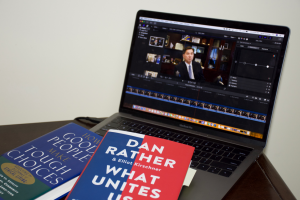Putting the Pieces Together
Now that I have completed my travels and almost all of my interviews, I want to begin putting  pieces together and reflect on what I have learned so far this summer. To help tie my findings together, I’ve been reading Dan Rather’s What Unites Us and Rushworth Kidder’s How Good People Make Tough Choices. The first is more related to the political aspect of my project, and the second is more about the ethics.
pieces together and reflect on what I have learned so far this summer. To help tie my findings together, I’ve been reading Dan Rather’s What Unites Us and Rushworth Kidder’s How Good People Make Tough Choices. The first is more related to the political aspect of my project, and the second is more about the ethics.
I started off this project by creating a survey to use as a guide for my interviews and as a way to check to see if there were any similarities or differences between the survey responses and the interview responses, as one was anonymous and one wasn’t. What I have noticed is that the interviews have reflected the survey results for the most part, but, in my opinion, there seemed to be a lot more introspection and deeper reflection in the interviews than the survey responses. For example, when I asked people in the survey what morals, out of a choice of 12 common ones, they strove to achieve on a daily basis, with the exception of two, each option was chosen over 75%. In the interviews, however, most people told me they lose sight of their own values when they get into debates over politics because in the heat of the moment, as one person said, “you’re thinking about how you can win the argument, not about your morals. Only after the fact do you think ‘maybe I was being a little too harsh.’”
Another thing I noticed to be different is that I think people were more honest in the surveys simply because it was anonymous. In my survey, 70% of people said that it is important they stay up to date with current news. But in the interviews, I can only recall one person saying that he did not actively stay up to date with the news. Along these lines, in addition to being up to date with current political events, almost everyone said they fact-check their information with sources that oppose their political views. The two most common responses in the interviews were either people who watch FOX News and occasionally check CNN or MSNBC or vice versa. I found that interesting as well because in the survey, only 58% of people said that having a variety of news sources is important to them. While I don’t think any of the interviewees are necessarily dishonest, I think when being filmed on camera there is a urge to not be as truthful about things that could make you look less credible.
I did find one example that is contrary to my thinking that the surveys are more honest than the interviews. In the survey, 25% of people said they tend to judge people who have different political views as them before they get to know them well, but nearly all the people in my interviews admitted to having preconceived biases about politics that affect the way they see people before they get to know them. I think this is partly due to the way I phrased the two (because in the survey it was phrased as a statement whereas in the interviews I asked it as a question) and also because, like I mentioned early, the interviewees seemed more reflective. In How Good People Make Tough Choices, Kidder writes about the “Nine Checkpoints of Ethical Decision-Making,” in which the first checkpoint is “recognize there is a moral issue” and the second checkpoint is “determine the actor.” I think that when it comes to the issue of personal political bias, on a surface level, there is a tendency to think that we are immune from this bias and we assume that we are not the actor and skip over the rest of the nine checkpoints. This is reflective of the results I talked about in one of my first letters where, in my survey, only 15% of all respondents thought their answers to a previous section were politically biased, yet 86% of all respondents thought that other people would answer in a politically biased way.
When I was reading What Unites Us, a quote that stuck out to me was this: “We often hear about how we need to be more tolerant: to make room for people, ideas, and actions with which we may not agree. This is a prerequisite for a functional democracy. But tolerance alone is not sufficient; it allows us to accept others without engaging with them, to feel smug and self-satisfied without challenging the boundaries within which too many of us live.” I hope that with the people I have talked to in my interviews, if they could take away one message, it would be that. Not only did I go into the interviews wanting to understand different people’s points of view and learning about who they are, but I wanted them to think about politics and their own biases and values in a way they might not have thought about before, to think about the issue more critically than surface-level. At the beginning of this summer, I would have thought that being tolerant of others’ views is the moral and ethical way to approach this topic, but I’ve learned throughout this experience that it’s more than that – it’s having a commitment to challenging your own biases every day.
